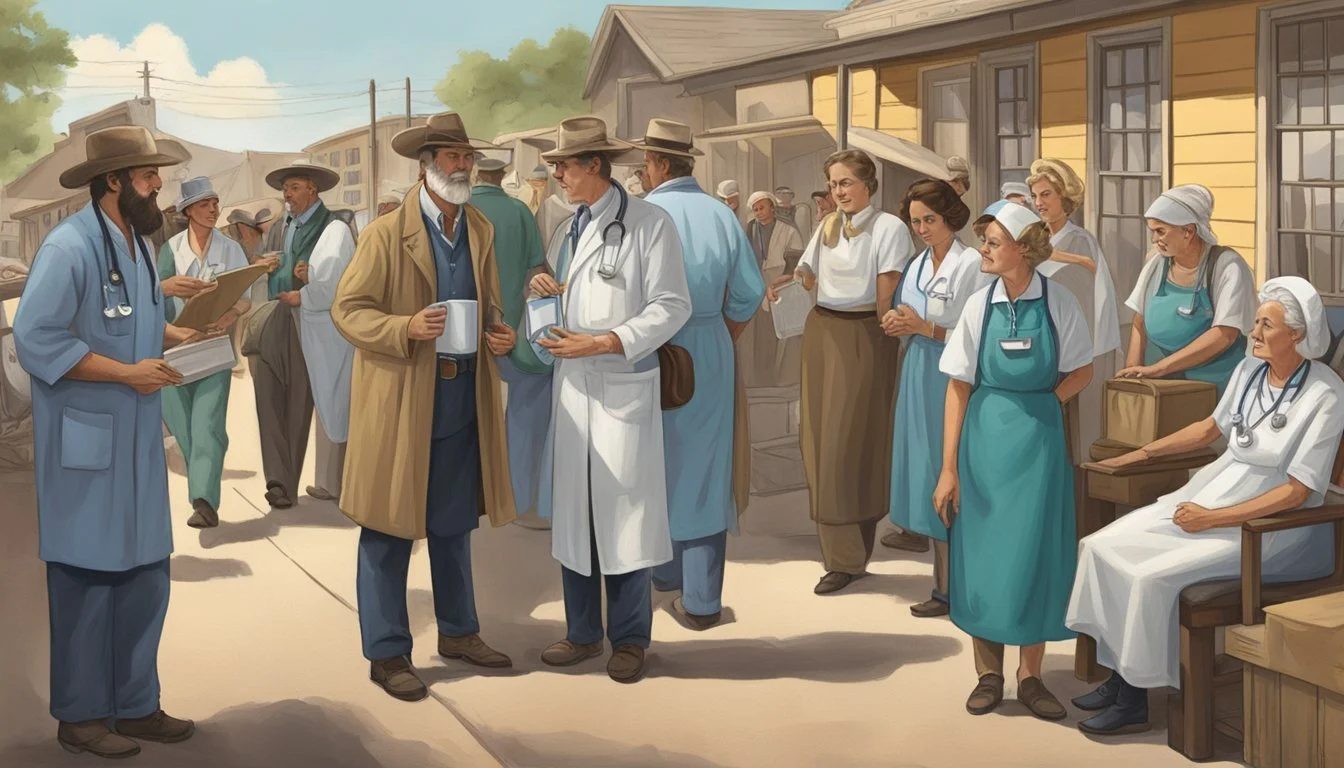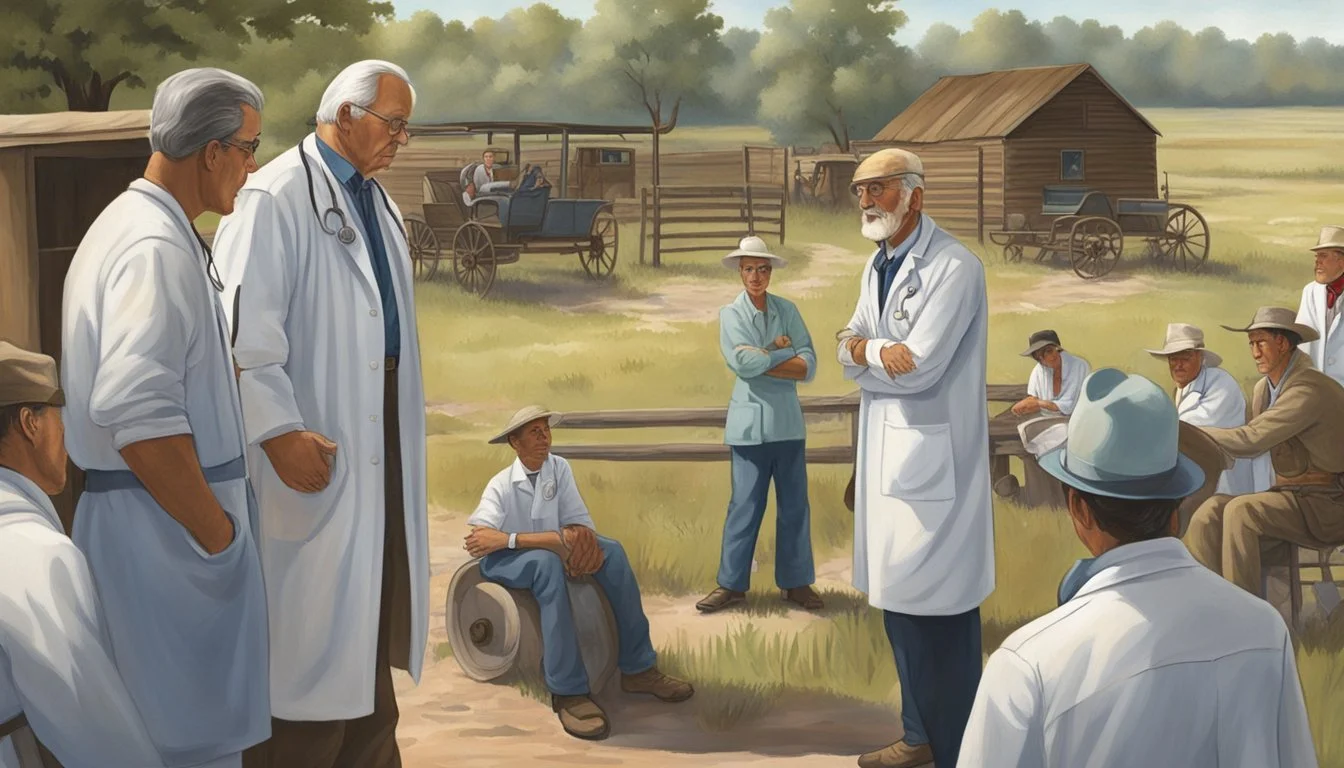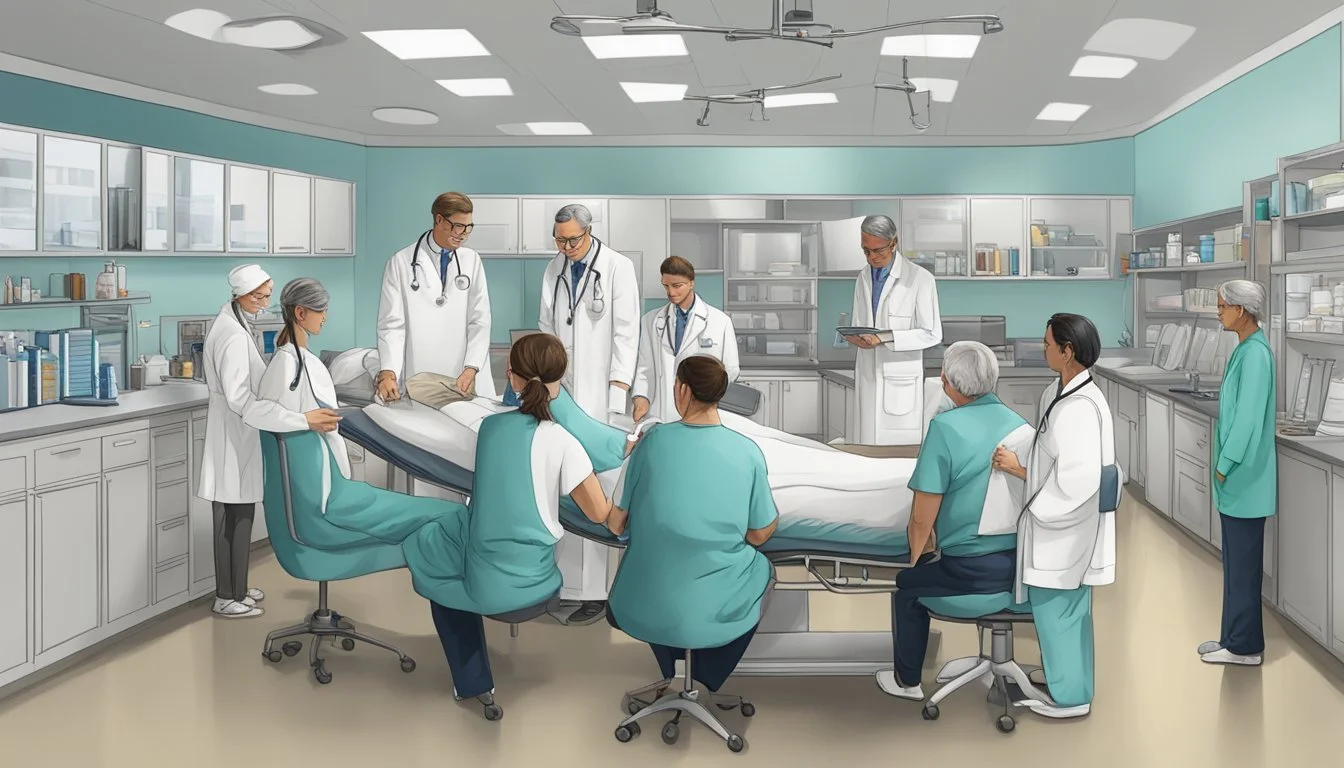German Texan Contributions to Texas Medicine
Pioneering Advances and Enduring Impact
The influence of German Texans on the medical landscape of Texas is both profound and enduring. Beginning in the 19th century, German immigrants brought with them a tradition of medical knowledge and innovation that significantly bolstered the state's healthcare practices. Their contributions to Texas medicine span various facets, including the establishment of hospitals, the advancement in medical procedures, and the cultivation of a holistic approach to healthcare that blends conventional medicine with natural remedies.
The medical ethos of German Texans, characterized by a strong work ethic and a dedication to community welfare, helped to establish foundational healthcare systems in the state. Particularly notable are their efforts in public health, pharmaceuticals, and medical education, which have left an indelible mark on the ways health services are provided and medical professionals are trained in Texas. Moreover, the integration of their medical traditions facilitated a unique cultural exchange that enriched Texan medical practices with a broader perspective on health and wellness.
German Texan physicians and health practitioners not only served the medical needs of their local communities but also became influential in the broader context of Texas medicine. Through charity, innovation, and leadership in medical associations, these individuals ensured that the integration of German medical practices played a pivotal role in shaping the overall development of healthcare in the state. Their legacy is evident in the strong presence of healthcare facilities and services that continue to benefit the population of Texas today.
Historical Overview of German Texan Immigration
The German influence in Texas, especially in the Hill Country, is a result of substantial immigration waves in the 19th century, establishing communities with lasting legacies in the state.
Origins and Early Settlements
The first German immigrants arrived in Texas during the early 1830s. These pioneers were typically groups of farmers and intellectuals who left Germany seeking political freedom, economic opportunities, and an escape from the post-war unrest that ensued after the 1848 revolution. They founded towns such as New Braunfels and Fredericksburg, which to this day reflect their German heritage.
Peak Immigration and Distribution
Immigration peaked during the mid-19th century, with thousands of Germans arriving in Texas. By 1850, Germans made up over five percent of the Texas population. They clustered in enclaves throughout Central Texas, in areas like Austin and San Antonio, and contributed significantly to the state's demographic and cultural composition.
Adelsverein and the German Belt
The Adelsverein, formally known as the Society for the Protection of German Immigrants in Texas, facilitated the settlement of thousands of Germans in Texas. Spearheading the establishment of settlements such as Fredericksburg and New Braunfels, the Adelsverein's mission was to create a "German Belt," a concentrated area of German culture. This area stretched over Central Texas' Hill Country and became known for its unique Texas-German dialect, customs, and collaboration with local Native Americans, such as the Comanches through treaties. Despite being proponents of the Union, many German-Texans served in the Civil War, and their communities faced severe hardships during both World Wars due to anti-German sentiment. Today, organizations like the German-Texan Heritage Society work to preserve and celebrate the history and culture of this influential group.
Cultural Integration and Influence
German-Texans have had a significant impact on the medical landscape in Texas through their integration and cultural contributions. This integration is particularly evident in the realms of language and education, customs and celebrations, as well as the press and literature.
Language and Education
The German language played an essential role in Texas's educational system, prominently in communities where German-Texans established schools. Texas German, a dialect found in certain Texas communities, originated from these educational practices. In places like New Braunfels and Fredericksburg, German was commonly used in both public and parochial schools, influencing the cultural and academic environment.
University Education:
German Influence: German-Texans were instrumental in incorporating German educational values into higher education, emphasizing rigorous academics and research, which benefited medical studies and practices.
Customs and Celebrations
German customs and celebrations have also contributed to the broader cultural tapestry of Texas, enriching community life and social cohesion, which indirectly supported the collective health of communities.
German-Texan Festivals Location Feature Octoberfest Fredericksburg Celebrating German heritage with food, music, and dance Wurstfest New Braunfels A unique blend of Texas culture with German sausage-making traditions German Culture Month Various Locations Activities highlighting German arts, traditions, and contributions to Texas
These celebrations not only promote cultural pride and unity but also serve as platforms for public health outreach, information dissemination, and fundraising for medical causes.
Press and Literature
The German press was vital in preserving German culture and language among German-Texans, as well as being an important avenue for educating the public on health matters. Newspapers in German, such as those published in Schulenburg and other German-Texan communities, often included literature and articles on medical advancements and health education.
German-Texan Literature:
Contribution: Provided written works and academic texts on medicine, often translating important medical knowledge from German to English, aiding in the education of Texas's medical professionals.
German Literature Societies (Verein): Fostered a preservation of German literature and promoted continued education, which included medical knowledge and health practices.
Contributions to Texas Medicine
The German Texans have made significant and lasting contributions to Texas medicine, from pioneering medical practices to the establishment of key healthcare facilities. They have played a crucial role in advancing health care in the state.
Pioneering Medical Practices
German Texan physicians introduced innovative medical techniques and practices to the Texan healthcare system. Among their key contributions was the introduction of new surgical procedures and the enhancement of medical treatment protocols which significantly improved patient care and outcomes. Their commitment to medical research and education helped Texas medicine keep pace with rapidly advancing medical knowledge in the late 19th and early 20th centuries.
Founding of Hospitals and Clinics
German Texans were instrumental in founding hospitals and clinics which served as cornerstones for community health. They not only established healthcare facilities, but also ensured that these institutions catered to the evolving medical needs of Texas's growing population. This network of hospitals and clinics laid the groundwork for the state's modern healthcare infrastructure, expanded access to medical care, and improved the overall health of the Texan populace.
Economic Contributions and Industry Impact
Texas has seen the German influence permeate through various economic sectors, most notably in agriculture, livestock, and urban trade, contributing significantly to the state’s GDP.
Agriculture and Livestock
German settlers in Texas excelled in agricultural innovation. Fredericksburg and surrounding areas benefited from advanced farming techniques that improved crop yields. This was largely due to German immigrants treating farming as a science. In terms of livestock, they introduced breeds and methods that increased productivity and are now core to Texas's economy.
Crop management: Introduction of new methods for soil conservation.
Livestock breeding: Crossbreeding techniques yielding healthier, more productive animals.
Trade and Urban Development
The economic impact on trade and urban development is evident in cities like San Antonio, where German influence laid the groundwork for modern commerce and urban planning. They established trade networks that connected Texas more firmly with the national and global markets.
Innovative industries: German immigrants started various businesses that became cornerstones of the Texan economy.
Urban planning: Their approach to city life introduced structured development, significantly shaping the landscape of Texan cities.
Social and Political Engagement
German Texans have consistently demonstrated a strong commitment to both community leadership and political involvement. Their active participation has significantly shaped the political and social fabric of areas such as New Braunfels, San Antonio, and Fredericksburg.
Community Leadership
In towns such as New Braunfels and Fredericksburg, German Texans left an indelible mark on local governance and community organization, fostering a sense of cultural heritage. They often held key positions in town councils and local committees, leading efforts to build infrastructure and provide healthcare services. For example, in New Braunfels, German settlers were instrumental in establishing local institutions that included not only medical facilities, but also schools and community centers.
Key Figures involved in Community Leadership:
Founder of New Braunfels: Prince Carl of Solms-Braunfels
Notable Leaders in San Antonio: Various members of the German community who have assumed leadership roles in civic and cultural organizations.
Political Involvement
Political engagement among German Texans was also notable, with many individuals taking active roles in state politics. Their political participation helped in the integration of their cultural values into the broader Texan culture, impacting areas such as public health policy and civic planning.
Political Positions and Influence:
Entity Contribution Politics German Texans held various political offices, influencing health policy and public services. San Antonio They contributed to shaping the city's policies, including those related to medical services. Cultural Heritage Political advocacy helped preserve German traditions while integrating into Texan society.
The bilingual nature of their political campaigns allowed for greater inclusion and dialogue in these communities, showcasing a commitment to democratic values and equitable representation.
Challenges and Adversities
The journey of German Texans in the field of medicine has been marked by significant hurdles, from cultural prejudices to political restrictions during global conflicts.
Prejudice and Conflict
German Texans encountered deep-seated prejudice in their pursuit of advancing medicine in Texas. During the Civil War, tensions divided communities, and those of German descent often faced ostracism, especially if their views did not align with the prevailing attitudes towards the conflict. They persevered in their medical practices despite being viewed with suspicion and at times open hostility.
World Wars Influence
World Wars had a profound impact on German Texans in medicine. World War I sparked a wave of anti-German sentiment, leading to tragic instances of violence against them. They struggled to practice medicine as their loyalty was questioned and their language banned under laws such as Texas House Bill 304 of 1919. World War II only heightened these difficulties, as fears of espionage and traitorous activities cast a shadow on their contributions to medical science even further. German Texan medical professionals had to navigate these societal adversities while striving to provide care and advance their field.
Preservation of German Heritage
The preservation of German heritage in Texas is a testament to the enduring impact of German Culture and the active efforts of societies and academic institutions. It encompasses a variety of cultural, educational, and historical initiatives that ensure this unique legacy continues to be an integral part of the state's cultural tapestry.
Cultural Societies and Events
The German-Texan Heritage Society is pivotal in maintaining German traditions through numerous events. These gatherings often feature music, food, and educational activities that celebrate German heritage. Fredericksburg, one of the most notable cities in the "German Belt" of Texas, plays host to many of these cultural events. Annual celebrations, such as Oktoberfest, bring German customs to the forefront, fostering community engagement and cultural exchange.
Literature and Scholarly Work
The University of Texas and the University of Texas Press have contributed significantly to scholarly research and literature, preserving the German language and stories of the early settlers. The University of Texas Press has published works such as "Reise Nach Texas", a travel account that provides insights into the lives of German immigrants in Texas. This literature serves as a valuable resource for understanding the historical journey of Germans in Texas and their contributions to the state. Moreover, these publications aid in preserving the language, which is a vital aspect of cultural heritage.
Conclusion
German Texans have significantly impacted the medical landscape of Texas. Their contributions are evident in the fields of medical education, healthcare provision, and research. Notable individuals of German descent played pivotal roles in the establishment of hospitals and clinics, bringing advanced medical practices and driving innovation in patient care.
The values of diligence, precision, and compassion often associated with the German Texan community have translated into the medical ethos in Texas. This has ensured the delivery of high-quality healthcare services to the state’s diverse population. Furthermore, their participation in medical legislation reflects a commitment to influencing policy for the betterment of public health.
Their influence continues to be seen in the ongoing commitment to medical excellence and community health. German contributions have thus been integral to the development of a robust medical sector in Texas, shaping it into the institution it is today.
German Texans’ legacy in medicine is an enduring aspect of Texas' rich history, underlining the profound impact that this cultural group has had on the state's progress and well-being.










